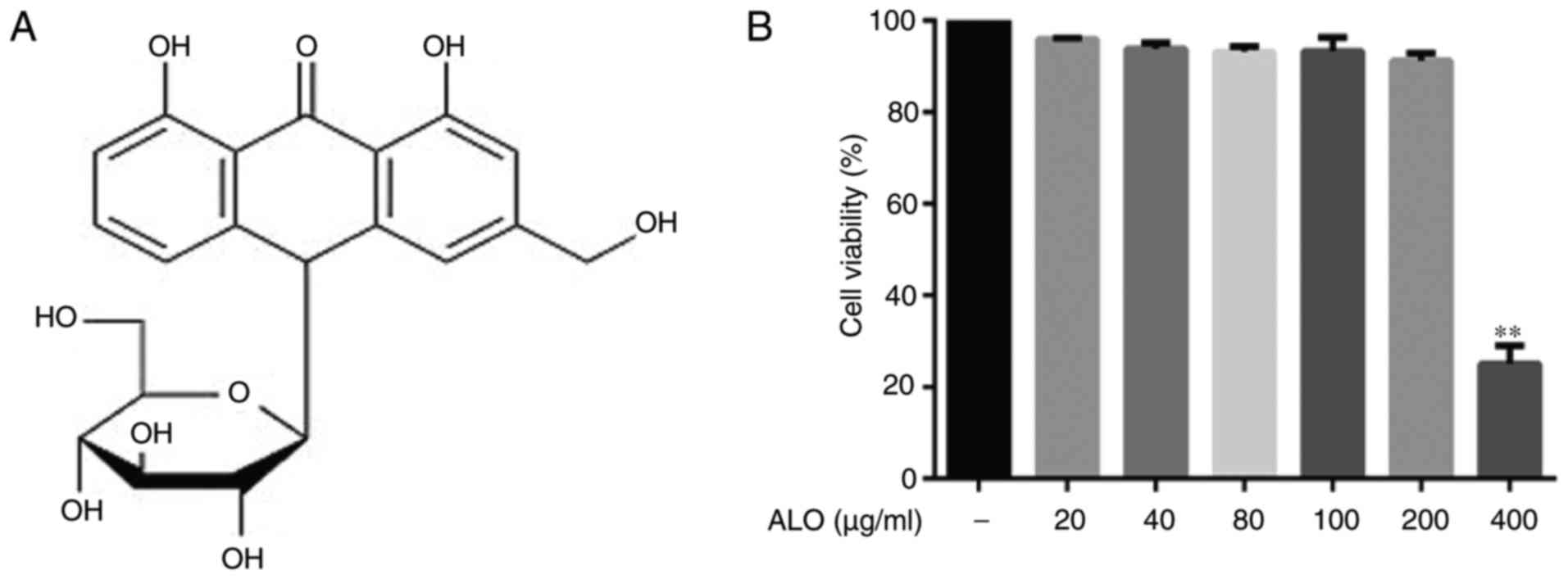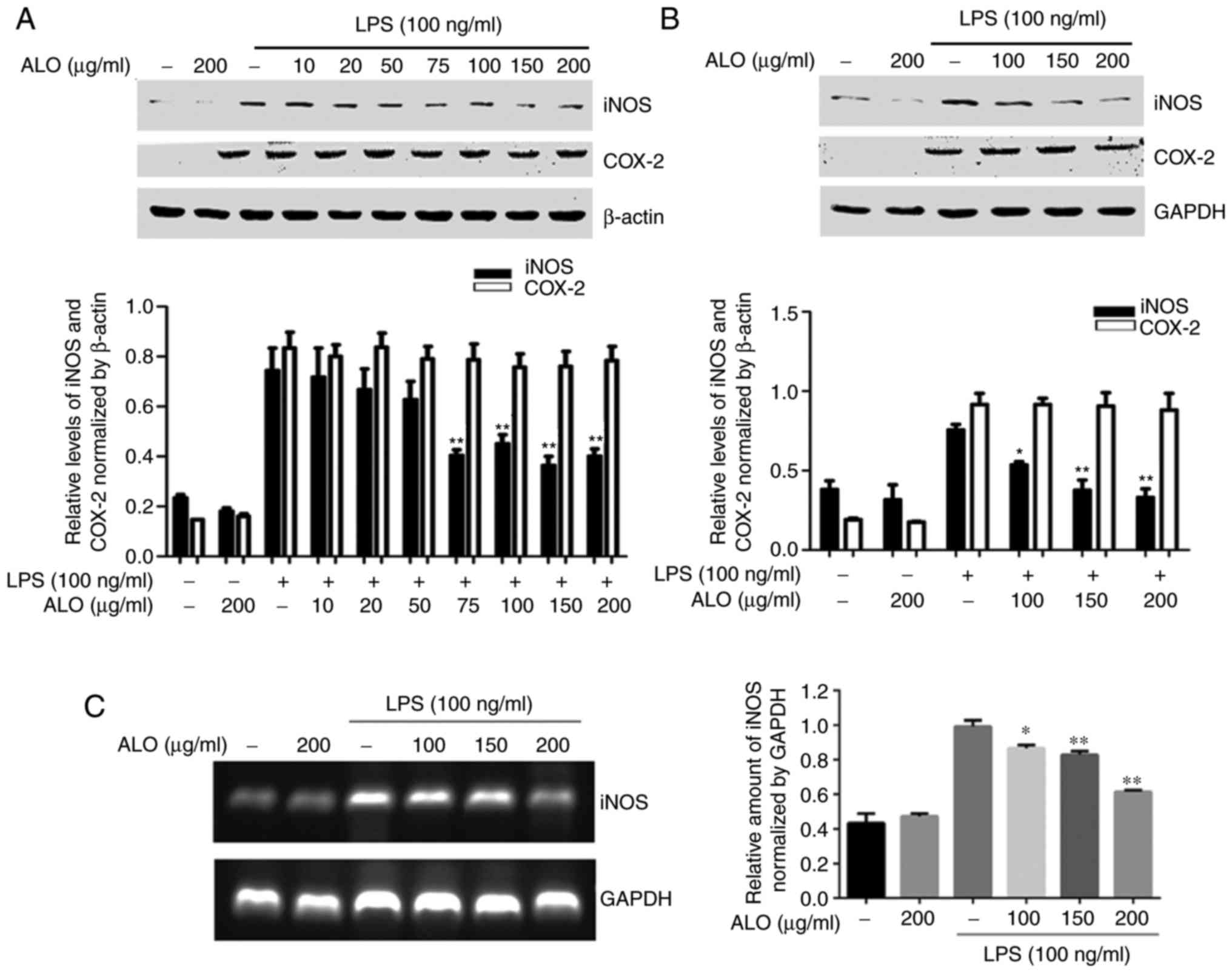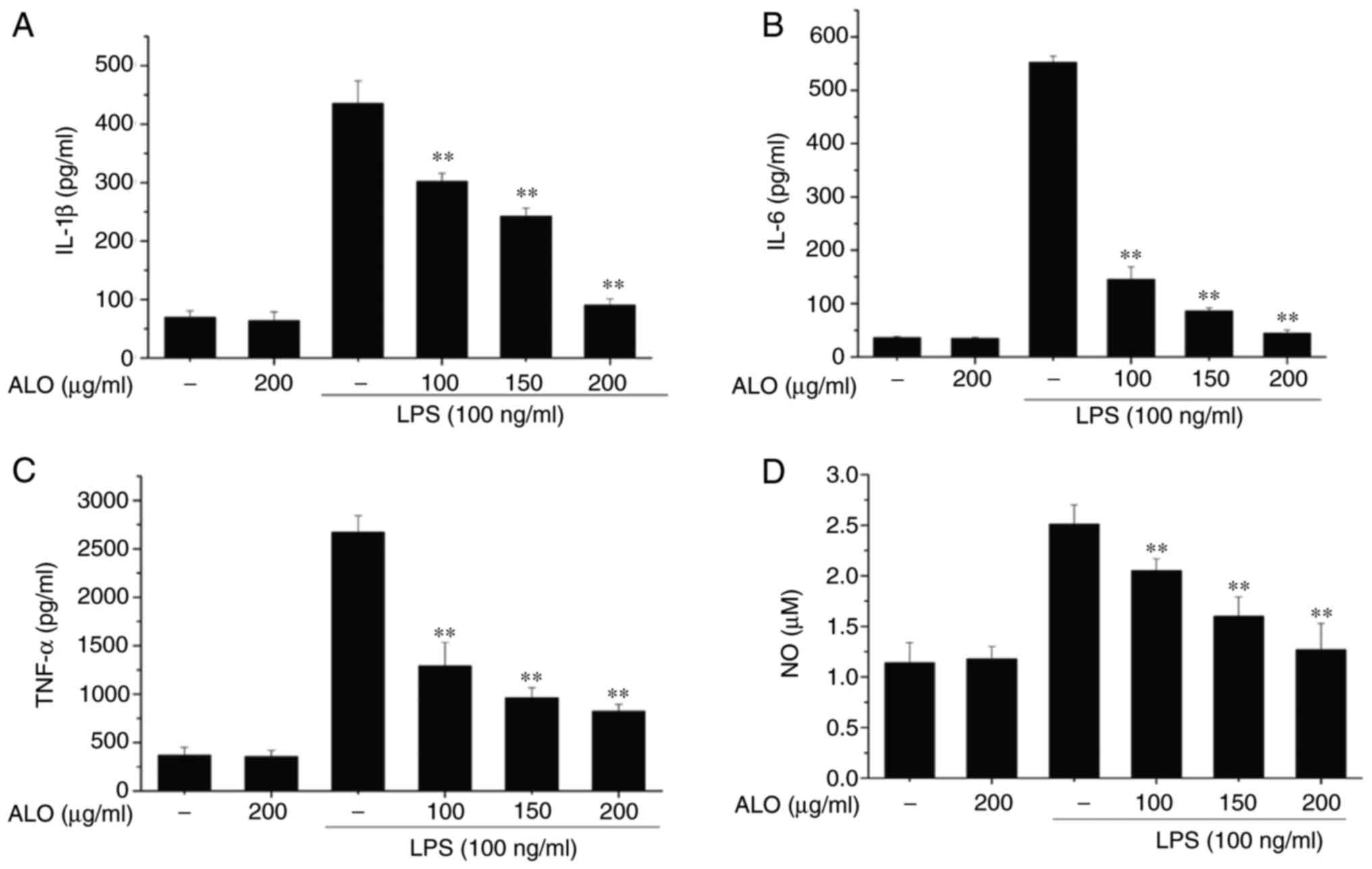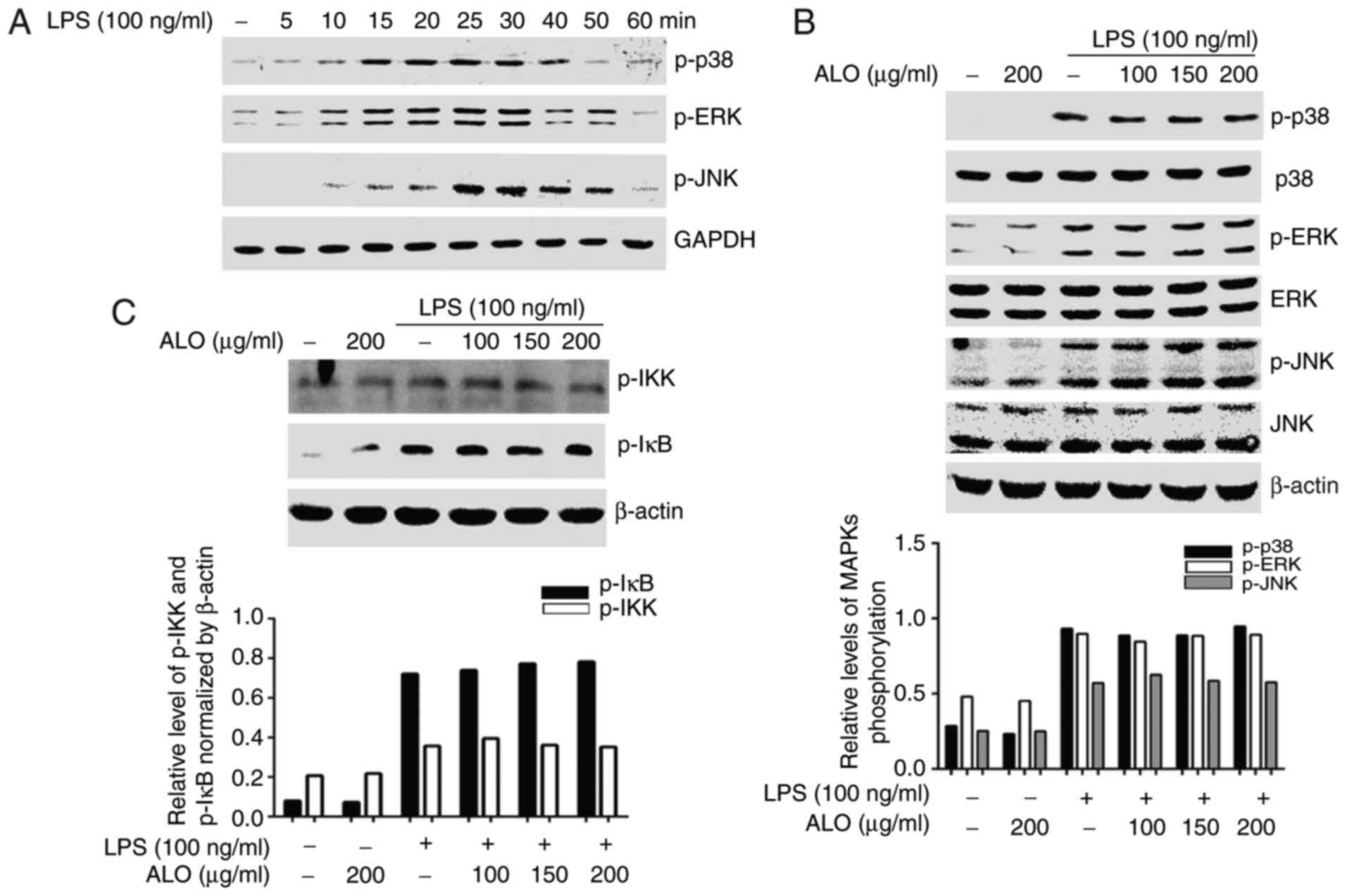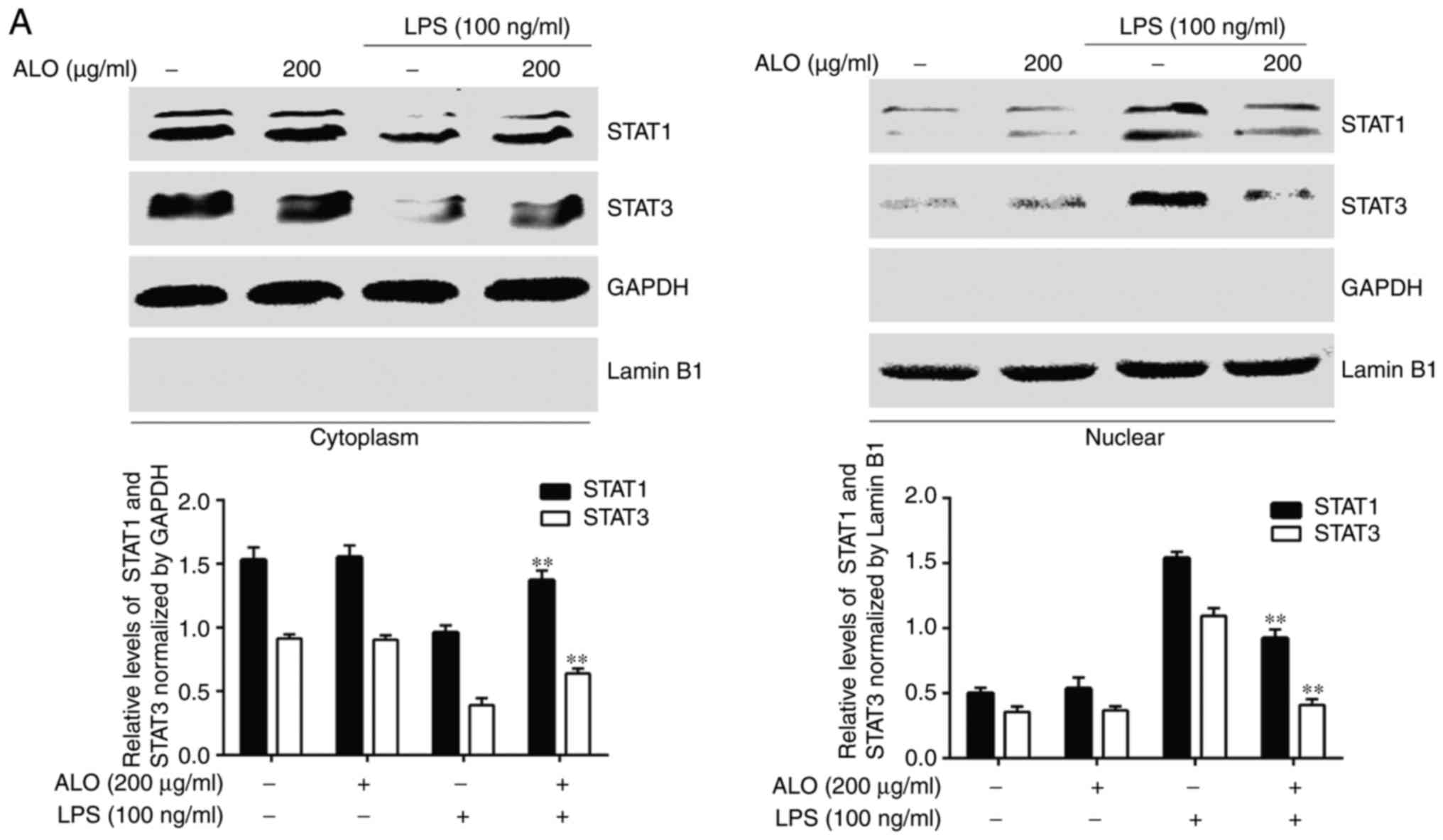|
1
|
Na HS, Song YR, Kim S, Heo JY, Chung HY
and Chung J: Aloin inhibits interleukin (IL)-1β-stimulated IL-8
production in KB cells. J Periodontol. 87:e108–115. 2016.
View Article : Google Scholar : PubMed/NCBI
|
|
2
|
Yu Q, Zeng KW, Ma XL, Jiang Y, Tu PF and
Wang XM: Ginsenoside Rk1 suppresses pro-inflammatory responses in
lipopolysaccharide-stimulated RAW264.7 cells by inhibiting the
Jak2/Stat3 pathway. Chin J Nat Med. 15:751–757. 2017.PubMed/NCBI
|
|
3
|
Guha M and Mackman N: LPS induction of
gene expression in human monocytes. Cell Signal. 13:85–94. 2001.
View Article : Google Scholar : PubMed/NCBI
|
|
4
|
Cochet F and Peri F: The role of
carbohydrates in the lipopolysaccharide (LPS)/toll-like receptor 4
(TLR4) signalling. Int J Mol Sci. 18:E23182017. View Article : Google Scholar : PubMed/NCBI
|
|
5
|
Chan ED and Riches DW: IFN-γ + LPS
induction of iNOS is modulated by ERK, JNK/SAPK, and
p38mapk in a mouse macrophage cell line. Am J Physiol
Cell Physiol. 280:C441–C450. 2001. View Article : Google Scholar : PubMed/NCBI
|
|
6
|
Qi Z, Yin F, Lu L, Shen L, Qi S, Lan L,
Luo L and Yin Z: Baicalein reduces lipopolysaccharide-induced
inflammation via suppressing JAK/STATs activation and ROS
production. Inflamm Res. 62:845–855. 2013. View Article : Google Scholar : PubMed/NCBI
|
|
7
|
Lee SB, Lee WS, Shin JS, Jang DS and Lee
KT: Xanthotoxin suppresses LPS-induced expression of iNOS, COX-2,
TNF-α, and IL-6 via AP-1, NF-κB, and JAK-STAT inactivation in RAW
264.7 macrophages. Int Immunopharmacol. 49:21–29. 2017. View Article : Google Scholar : PubMed/NCBI
|
|
8
|
Qi S, Feng Z, Li Q, Qi Z and Zhang Y:
Myricitrin modulates NADPH oxidase-dependent ROS production to
inhibit endotoxin-mediated inflammation by blocking the JAK/STAT1
and NOX2/p47phox pathways. Oxid Med Cell Longev.
2017:97387452017.
|
|
9
|
Ganster RW, Taylor BS, Shao L and Geller
DA: Complex regulation of human inducible nitric oxide synthase
gene transcription by Stat 1 and NF-kappa B. Proc Natl Acad Sci
USA. 98:8638–8643. 2001. View Article : Google Scholar : PubMed/NCBI
|
|
10
|
Zhou Y, Wang J, Yang W, Qi X, Lan L, Luo L
and Yin Z: Bergapten prevents lipopolysaccharide-induced
inflammation in RAW264.7 cells through suppressing JAK/STAT
activation and ROS production and increases the survival rate of
mice after LPS challenge. Int Immunopharmacol. 48:159–168. 2017.
View Article : Google Scholar : PubMed/NCBI
|
|
11
|
Qi Z, Qi S, Ling L, Lv J and Feng Z:
Salidroside attenuates inflammatory response via suppressing
JAK2-STAT3 pathway activation and preventing STAT3 transfer into
nucleus. Int Immunopharmacol. 35:265–271. 2016. View Article : Google Scholar : PubMed/NCBI
|
|
12
|
Liu FW, Liu FC, Wang YR, Tsai HI and Yu
HP: Aloin protects skin fibroblasts from heat stress-induced
oxidative stress damage by regulating the oxidative defense system.
PLoS One. 10:e01435282015. View Article : Google Scholar : PubMed/NCBI
|
|
13
|
Park MY, Kwon HJ and Sung MK: Evaluation
of aloin and aloe-emodin as anti-inflammatory agents in aloe by
using murine macrophages. Biosci Biotechnol Biochem. 73:828–832.
2009. View Article : Google Scholar : PubMed/NCBI
|
|
14
|
Esmat AY, Said MM and Khalil SA: Aloin: A
natural antitumor anthraquinone glycoside with iron chelating and
non-atherogenic activities. Pharm Biol. 53:138–146. 2015.
View Article : Google Scholar
|
|
15
|
Buenz EJ: Aloin induces apoptosis in
Jurkat cells. Toxicol In Vitro. 22:422–429. 2008. View Article : Google Scholar
|
|
16
|
Wan L, Zhang L, Fan K and Wang J: Aloin
promotes A549 cell apoptosis via the reactive oxygen speciesmitogen
activated protein kinase signaling pathway and p53 phosphorylation.
Mol Med Rep. 16:5759–5768. 2017. View Article : Google Scholar : PubMed/NCBI
|
|
17
|
Chang R, Zhou R, Qi X, Wang J, Wu F, Yang
W, Zhang W, Sun T, Li Y and Yu J: Protective effects of aloin on
oxygen and glucose deprivation-induced injury in PC12 cells. Brain
Res Bull. 121:75–83. 2016. View Article : Google Scholar : PubMed/NCBI
|
|
18
|
Pengjam Y, Madhyastha H, Madhyastha R,
Yamaguchi Y, Nakajima Y and Maruyama M: NF-κB pathway inhibition by
anthrocyclic glycoside aloin is key event in preventing
osteoclastogenesis in RAW264.7 cells. Phytomedicine. 23:417–428.
2016. View Article : Google Scholar : PubMed/NCBI
|
|
19
|
Pengjam Y, Madhyastha H, Madhyastha R,
Yamaguchi Y, Nakajima Y and Maruyama M: Anthraquinone glycoside
aloin induces osteogenic initiation of MC3T3-E1 cells: Involvement
of MAPK mediated wnt and bmp signaling. Biomol Ther. 24:123–131.
2016. View Article : Google Scholar
|
|
20
|
Han BH, Lee YJ, Yoon JJ, Choi ES, Namgung
S, Jin XJ, Jeong DH, Kang DG and Lee HS: Hwangryunhaedoktang exerts
anti-inflammation on LPS-induced NO production by suppressing MAPK
and NF-κB activation in RAW264.7 macrophages. J Integr Med.
15:326–336. 2017. View Article : Google Scholar : PubMed/NCBI
|
|
21
|
Achoui M, Appleton D, Abdulla MA, Awang K,
Mohd MA and Mustafa MR: In vitro and in vivo anti-inflammatory
activity of 17-Oacetylacuminolide through the inhibition of
cytokines, NF-κB translocation and IKK β activity. PLoS One. 5. pp.
e151052010, View Article : Google Scholar
|
|
22
|
Qi S, Xin Y, Guo Y, Diao Y, Kou X, Luo L
and Yin Z: Ampelopsin reduces endotoxic inflammation via repressing
ROS-mediated activation of PI3K/Akt/NF-κB signaling pathways. Int
Immunopharmacol. 12:278–287. 2012. View Article : Google Scholar
|
|
23
|
Pan X, Cao X, Li N, Xu Y, Wu Q, Bai J, Yin
Z, Luo L and Lan L: Forsythin inhibits lipopolysaccharide-induced
inflammation by suppressing JAK-STAT and p38 MAPK signalings and
ROS production. Inflamm Res. 63:597–608. 2014. View Article : Google Scholar : PubMed/NCBI
|
|
24
|
Simon AR, Rai U, Fanburg BL and Cochran
BH: Activation of the JAK-STAT pathway by reactive oxygen species.
Am J Physiol. 275:C1640–C1652. 1998. View Article : Google Scholar : PubMed/NCBI
|
|
25
|
Cui Y, Ye Q, Wang H, Li Y, Xia X, Yao W
and Qian H: Aloin protects against chronic alcoholic liver injury
via attenuating lipid accumulation, oxidative stress and
inflammation in mice. Arch Pharm Res. 37:1624–1633. 2014.
View Article : Google Scholar : PubMed/NCBI
|
|
26
|
Balk RA: Systemic inflammatory response
syndrome (SIRS): Where did it come from and is it still relevant
today? Virulence. 5:20–26. 2014. View Article : Google Scholar :
|
|
27
|
Mueller M, Hobiger S and Jungbauer A: Red
clover extract: A source for substances that activate peroxisome
proliferator-activated receptor alpha and ameliorate the cytokine
secretion profile of lipopolysaccharide-stimulated macrophages.
Menopause. 17:379–387. 2010. View Article : Google Scholar : PubMed/NCBI
|
|
28
|
Fylaktakidou KC, Hadjipavlou-Litina DJ,
Litinas KE and Nicolaides DN: Natural and synthetic coumarin
derivatives with anti-inflammatory/antioxidant activities. Curr
Pharm Des. 10:3813–3833. 2004. View Article : Google Scholar
|
|
29
|
Mueller M, Hobiger S and Jungbauer A:
Anti-inflammatory activity of extracts from fruits, herbs and
spices. Food Chem. 122:987–996. 2010. View Article : Google Scholar
|
|
30
|
Akaberi M, Sobhani Z, Javadi B, Sahebkar A
and Emami SA: Therapeutic effects of Aloe spp. in traditional and
modern medicine: A review. Biomed Pharmacother. 84:759–772. 2016.
View Article : Google Scholar : PubMed/NCBI
|
|
31
|
Patel DK, Patel K and Tahilyani V:
Barbaloin: A concise report of its pharmacological and analytical
aspects. Asian Pac J Trop Biomed. 2:835–838. 2012. View Article : Google Scholar
|
|
32
|
Swierkosz TA, Mitchell JA, Warner TD,
Botting RM and Vane JR: Co-induction of nitric oxide synthase and
cyclo-oxygenase: Interactions between nitric oxide and prostanoids.
Br J Pharmacol. 114:1335–1342. 1995. View Article : Google Scholar : PubMed/NCBI
|
|
33
|
Aparicio-Soto M, Sanchez-Hidalgo M,
Cardeno A, Rosillo MÁ, Sánchez-Fidalgo S, Utrilla J, Martín-Lacave
I and Alarcón-de-la-Lastra C: Dietary extra virgin olive oil
attenuates kidney injury in pristane-induced SLE model via
activation of HO-1/Nrf-2 antioxidant pathway and suppression of
JAK/STAT, NF-κB and MAPK activation. J Nutr Biochem. 27:278–288.
2016. View Article : Google Scholar
|
|
34
|
Schindler C, Levy DE and Decker T:
JAK-STAT signaling: From interferons to cytokines. J Biol Chem.
282:20059–20063. 2007. View Article : Google Scholar : PubMed/NCBI
|
|
35
|
Luo X, Zhang H, Wei X, Shi M, Fan P, Xie
W, Zhang Y and Xu N: Aloin suppresses lipopolysaccharide-induced
inflammatory response and apoptosis by inhibiting the activation of
NF-κB. Molecules. 23:E5172018. View Article : Google Scholar
|
|
36
|
Han W, Li H, Cai J, Gleaves LA, Polosukhin
VV, Segal BH, Yull FE and Blackwell TS: NADPH oxidase limits
lipopolysaccharide-induced lung inflammation and injury in mice
through reduction-oxidation regulation of NF-κB activity. J
Immunol. 190:4786–4794. 2013. View Article : Google Scholar : PubMed/NCBI
|
|
37
|
Pan JS, Hong MZ and Ren JL: Reactive
oxygen species: A double-edged sword in oncogenesis. World J
Gastroenterol. 15:1702–1707. 2009. View Article : Google Scholar : PubMed/NCBI
|
|
38
|
Park SK, Dahmer MK and Quasney MW: MAPK
and JAK-STAT signaling pathways are involved in the oxidative
stress-induced decrease in expression of surfactant protein genes.
Cell Physiol Biochem. 30:334–346. 2012. View Article : Google Scholar : PubMed/NCBI
|















